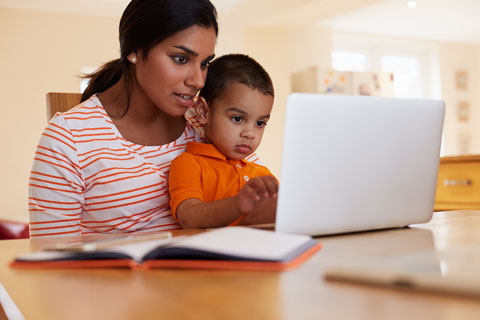“Screen time” refers to time spent using a device (e.g., television, game console, tablet, computer, smartphone). In this Q&A, we respond to several questions about screen time and young children.
What does research tell us about screen time and very young children?
Increasingly, children are spending more time using a screen for learning and entertainment. The American Academy of Pediatrics (AAP) is concerned about the impact that large amounts of screen time may have on children’s growth and development. There is a concern that increased screen time means children are missing out on time playing with real objects and toys and are less actively involved with others.
Consider the results from two research studies on screens and young children’s development.
The Pew Research Center (2020) reports the following statistics about screen time:
- 74% of U.S. parents report that their child birth to age 2 watches television; that number rises to 90% for 3- and 4-year-old children
- 35% of parents say their infant or toddler engages with a tablet; that number rises to 64% for preschoolers
- 49% of parents report that their infant or toddler engages with a smartphone; for preschoolers that number rises to 62%
- About 70% of parents think smartphones could bring more harm than good to children
- The majority of parents are at least somewhat concerned about their child spending too much time in front of screens
The impact of screen time on young children as reported by AAP (2016):
- Watching television to fall asleep or as background noise can negatively impact a young child’s sleep
- Excessive television viewing is associated with delays in cognitive, language, and social-emotional development in the early years and can result in behavior problems.
- Heavy media use in the toddler and preschool years can increase a child’s body mass index (BMI) and risk for obesity later in childhood.
- Watching too much television as a young child can negatively impact future reading levels in elementary school
More work needs to be done to help parents and caregivers make informed decisions about the amount of time that young children should be exposed to screen media.
How can adults make the most of screen time?
Parents and caregivers can enhance young children’s experiences with screen time by closely monitoring content, responding to the content, and connecting the content with children’s lives and surroundings. Parents can
- Limit children’s attention to screen content that is positive, engaging, and relates to their experiences. Young children should not be exposed to violent screen content.
- Help children connect what they see on the screen with items in the real world (e.g., go outside to look for birds after playing a digital game with birds).
- Interact with children while reading stories on a tablet or watching a video online. Ask them to make predictions about what might happen next (e.g., a parent can ask, “What do you think might happen when Little Bear opens the door?”).
- Watch responsive, child-focused TV shows and limit the amount of time the TV is on when children are present. Responsive children’s shows include characters that encourage children to repeat a word or answer a question. Keep TVs out of a child’s bedroom, when possible.
- Create a family media use plan that works with your family’s schedule, values, and lifestyle. Deciding on when, where, and how much you use media as a family can be helpful in balancing your online and offline lives.
- Avoid background TV noise, which can distract children from focusing on important learning. This can interfere with young children’s development in several important areas (cognitive, language, and executive functioning).
- Have a plan for engaging with infants and toddlers, as well as young children, while they interact with technology.
In 2016, the AAP published a set of guidelines for parents that addressed the use of media with young children.
What can adults do to model appropriate use of screen time?
Children notice when the adults they love and respect consciously limit their screen time. Adults also are using screens both at work and home. Some children and adults find it difficult to “turn off” their devices. Children value undistracted attention from the significant adults in their lives. Interactions with caring adults cannot be replaced by technology.
Try to limit your screen use when you are with young children. Take advantage of time with children to build relationships. Engage in conversations while riding the bus, waiting in line at the store, and eating meals together. Turn off the TV when no one is watching it.
IEL Resources
Web Resources
-
Beyond Screen Time: Help Your Kids Build Healthy Media Use Habits
Source: HealthyChildren.org
This article offers media use guidelines for parents of young children.
-
Children’s engagement with digital devices, screen time
Source: Pew Research
This article describes statistics associated with young children’s use of screens.
-
How to Make a Family Media Use Plan
Source: HealthyChildren.org
This resource gives tips to families on media use and includes an interactive tool developed by the American Academy of Pediatrics (AAP) to create a personalized family media use plan.
-
Media and Young Minds
Source: American Academy of Pediatrics (AAP)
This policy statement compiles research on screen time and young children and makes recommendations for families of young children and health care providers on how to manage children’s technology use.
-
Parents of Young Children: Put Down Your Smartphones
Source: HealthyChildren.org
This article gives parents some tips to enhance their child’s communication skills while limiting technology use.


